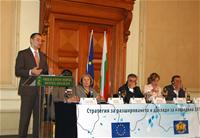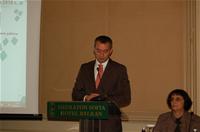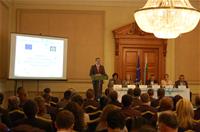A message from Sofia to the Western Balkans
Adelina Marini, December 1, 2010
 The relations among the Balkan countries often are earmarked by decades and even centuries of hostilities, conflicts and memories. It is no accident that the region is popular as a "powder keg", because history had so far shown that if a solution cannot be found, the guns are being taken out. But has the time come for a change? A strong signal in this direction gave the Bulgarian foreign minister Nikolay Mladenov during the presentation in Sofia on November 25 of the progress reports of the European Commission for the countries of the Western Balkans. Mr Mladenov skillfully used the event to outline the basic accents of the Bulgarian foreign policy towards the Balkan neighbours.
The relations among the Balkan countries often are earmarked by decades and even centuries of hostilities, conflicts and memories. It is no accident that the region is popular as a "powder keg", because history had so far shown that if a solution cannot be found, the guns are being taken out. But has the time come for a change? A strong signal in this direction gave the Bulgarian foreign minister Nikolay Mladenov during the presentation in Sofia on November 25 of the progress reports of the European Commission for the countries of the Western Balkans. Mr Mladenov skillfully used the event to outline the basic accents of the Bulgarian foreign policy towards the Balkan neighbours.
The European Union and the three pillars
One of the important things which Minister Mladenov did during his almost 40-minute long speech was to admit the major mistakes which Bulgaria made in its process of joining the European Union, as well as to share the problems that these mistakes led to. This is why, before conveying his message to all Western Balkan countries and Turkey, he outlined the three pillars with which "no compromise should be made".
These three pillars are internal reforms, regional cooperation and good neighbourly relations and it was these three pillars that Nikolay Mladenov emphasized on several times during his speech. Besides, he also rebuked the European Union, without distancing Bulgaria from it, by stating that the real debate on what has to be done for the countries of the Western Balkans in order to support them on their path to EU accession has still not been held. Although he acknowledged that there are good reasons for not holding this conversation like Europe's financial problems and the political realities in all member states, he still said:
"The danger of delaying our internal European debate about the enlargement towards the Balkans, however, is very serious. This danger puts at risk all people in the Balkans, who have staked their lives in order to see their countries as part of the EU. And I don't want us to wake up one day when the sociologists make a poll and it appears that in the countries of the Western Balkans, where now there is a solid majority of reforms-oriented people, wanting their countries to be part of the EU, ready to walk the path of reforms, this majority has become a minority".
He added that it was necessary Europe to constantly recall its commitment to these countries and that the countries from Central and Eastern Europe should have a leading role. This was probably why he defined 2011 as the year of Central and Eastern Europe because for the first time in European history two new member states would preside over the Union - in the first half of the year Hungary and in the second - Poland. Furthermore, without giving any specific proposals or serious arguments for optimism, he wished all candidate-countries from the Western Balkans to be either part of the EU or to be on the last step to their accession before the Bulgarian presidency of the EU in 2018. But how possible this is?
Sincerely and personally about Croatia
It is hard to say something bad about a country like Croatia, but we should give credit to the Bulgarian foreign minister who said what Bulgaria has to say, especially in a moment when there are serious speculations on whether Croatia would meet the dawn just like Bulgaria and Romania with a control mechanism. "Croatia has Bulgaria's support on this path and Bulgaria does not intend to use any tools that have nothing to do with Croatia's accession to the EU, for political pressure in one or another direction. I say this because I know the rumours that are circulating not only in Bulgaria but in other countries as well. I say this because I think that the problems we have to solve cannot be solved neither in Zagreb, nor in Brussels. They will be solved in Sofia and should not turn into a tool that would impede other countries".
Kosovo, the Hague and the Western outskirts
The country in the Western Balkans which, as it seems, will have the most work  to do is Serbia. The most work not because the country is performing the worst of all on some of EU membership criteria, but because of the implementation of two of the three pillars Mr Mladenov outlined as fundamental for its euro-integration. Serbia has already made a step forward in this process by filing an application for membership in the European Union and Brussels responded by sending the regular questionnaire. There are, however, several but-s. The first, quite expectedly, is Kosovo. According to Nikolay Mladenov Kosovo cannot remain a hole on the map of South-Eastern Europe and it is necessary as soon as possible work on a road map for visa liberalisation for the citizens of Kosovo to begin.
to do is Serbia. The most work not because the country is performing the worst of all on some of EU membership criteria, but because of the implementation of two of the three pillars Mr Mladenov outlined as fundamental for its euro-integration. Serbia has already made a step forward in this process by filing an application for membership in the European Union and Brussels responded by sending the regular questionnaire. There are, however, several but-s. The first, quite expectedly, is Kosovo. According to Nikolay Mladenov Kosovo cannot remain a hole on the map of South-Eastern Europe and it is necessary as soon as possible work on a road map for visa liberalisation for the citizens of Kosovo to begin.
On the second, the first Bulgarian diplomat made another serious step forward in formulating a clear and mature position which he skillfully inserted in the European context.
In fact he started from far away by responding indirectly to the numerous calls in our Western neighbour that if things do not go well with Europe, Serbia has an alternative. The Bulgarian foreign minister explained that there was no alternative for the Balkan countries, aside from the European one and he directly addressed a problem, frequently concealed by Bulgarian diplomacy so far: "I address this issue because I don't see another framework in which the rights of our fellow citizens [in the Western outskirts] in Serbia could be integrated, except from the European framework. I don't see another perspective for the economic development of the regions they live in, for their social development, for their integration in society except strict respect of European legislation. This is the best guarantee for us, this is the best guarantee for them, this is the best guarantee for all citizens of the Republic of Serbia".
The romantic page in Bulgarian history
And another signal for a diplomatic maturity - the message which Minister Mladenov conveyed to Macedonia was aside from firm, but also creating the feeling that there is no alternative. "And this is why I think that every responsible politician should at some point ask himself the question - what is more important for me the past or the future? If he chooses the past, then he would lose the future. If he chooses the future, then he will be able to realise much bigger successes for his country then only if he would base his policies on the search of explanations, of reasons for his existence in the books, in building of memorials, etc."
Furthermore, our foreign minister admitted that given the continuing occurrence of insults in the Macedonian public space towards Bulgaria, currently our country refrained from direct communication with Macedonia. "This is not an indication of good neighbourly relations because being the first country that has recognised our neighbour for independent, that has recognised them under their constitutional name, there is no single reason that they had seen anything bad from our country". Nonetheless, Bulgaria will continue to support Macedonia on its path towards Europe, because the stability of the country is important for everybody in the region but, of course, this will happen only when Skopje would realise what do good neighbourly relations mean.
Has the time come for Bosnia and Herzegovina to get out of Dayton?
The triethnic country also appeared to be important for the stability in the region in Bulgarian foreign minister's speech. This is why he called on the country to succeed in finding its new consensus that would secure a constitution, guaranteeing the rights of the three communities in the country and creating guarantees that none of the three would prevail over the others. Moreover, Nikolay Mladenov raised the question whether Bosnia was ready to get out of the spotlight of Dayton and take the responsibility of its own institutions, without needing the permanent international protectorate. According to Mladenov, a major element in guaranteeing Bosnia's stability is the country to receive a perspective for NATO with which, he said, Bulgaria could actively help.
This difficult issue Turkey
Responding to criticism that Bulgarian diplomacy so far was passive with regard to the future EU membership of Turkey, Nikolay Mladenov managed to outline diplomatically his views about this country. I will quote his statement precisely because it just needs no further comments:
"We cannot not pay attention to another neighbour of ours, not in the Western Balkans but in the corner of the Eastern Balkans - Turkey. We cannot because Turkey is also a candidate country for the EU, to which Europe had undertaken a legally binding commitment to hold negotiations. The speed of these negotiations, however, depends on the reforms in Turkey itself. That speed depends also on the way Turkey will go, reforming its entire society and implementing the European criteria and norms. Bulgaria is the last country that became a member of the EU and will not be the first to oppose membership of any other. But us being the last country to join the EU and seeing our own difficulties with implementing the common legislation in some areas, Bulgaria will also be the first country to insist any next country from now on to be fully prepared to be a part of the EU. Because we realise our responsibility, the tough path we went through and that our neighbours to the east and the west should be able to be prepared to take that same responsibility".
 According to Minister Mladenov the EU cannot give up on its negotiations with Turkey because this is the inly instrument for reforming Turkish society. Moreover, the progress Turkey will realise on its path towards EU integration will create "huge opportunities and advantages" for Bulgaria for cooperation in the area of energy, transport, economic cooperation.
According to Minister Mladenov the EU cannot give up on its negotiations with Turkey because this is the inly instrument for reforming Turkish society. Moreover, the progress Turkey will realise on its path towards EU integration will create "huge opportunities and advantages" for Bulgaria for cooperation in the area of energy, transport, economic cooperation.
Nikolay Mladenov spent a little time for Montenegro and Albania, noting only that both countries should do reforms that are no less complex than the others. In conclusion he again demonstrated maturity by saying that the biggest challenge the Balkans face is to prove "that reforms are not being done only to be showed to our European partners, but rather the reforms are done so that they could be sustainable and to show real results, real progress before our own citizens. This is the biggest lesson from Bulgaria's accession to the EU. And this lesson if we bring it to our neighbours and help them understand it, we will save them much of the pain we went through the last year and in some areas we still are going through".
 Bakir Izetbegovic, Andrej Plenkovic | © Council of the EU
Bakir Izetbegovic, Andrej Plenkovic | © Council of the EU Aleksandar Vucic, Recep Tayyip Erdogan | © Serbian Presidency
Aleksandar Vucic, Recep Tayyip Erdogan | © Serbian Presidency Jean-Claude Juncker, Zoran Zaev | © European Commission
Jean-Claude Juncker, Zoran Zaev | © European Commission